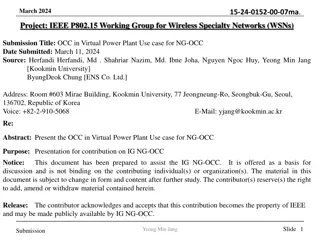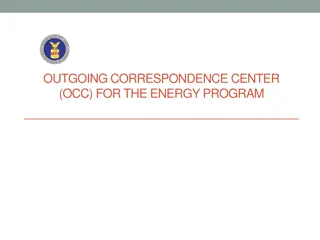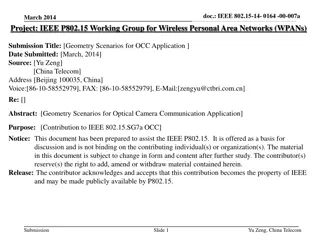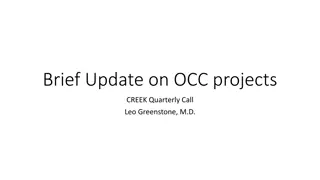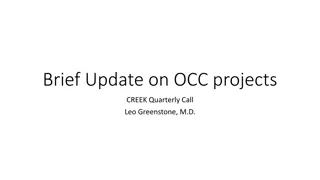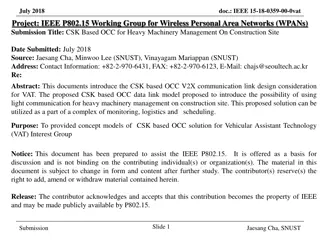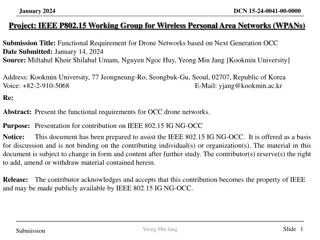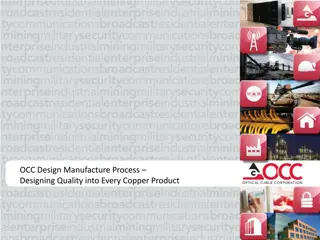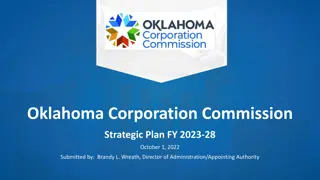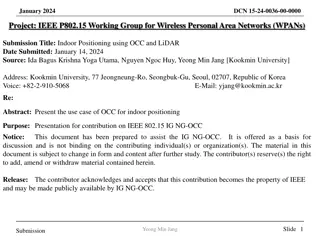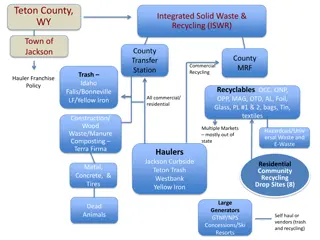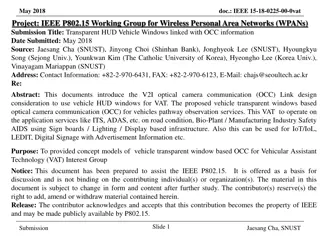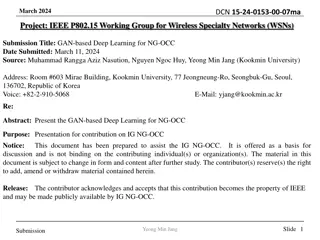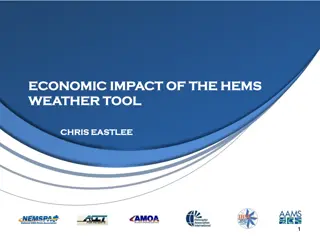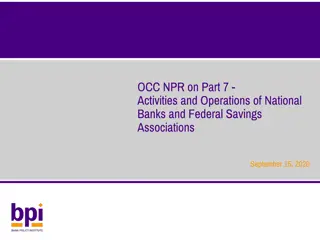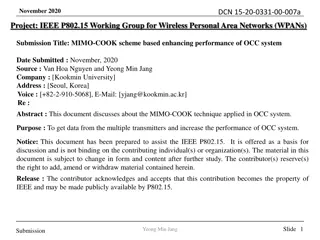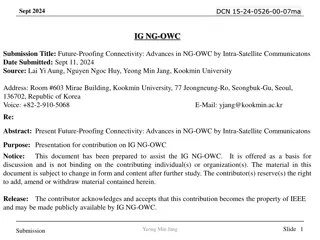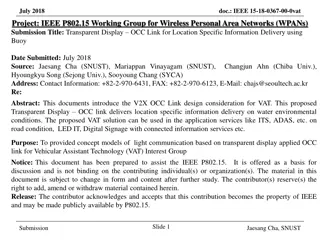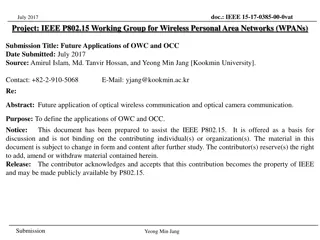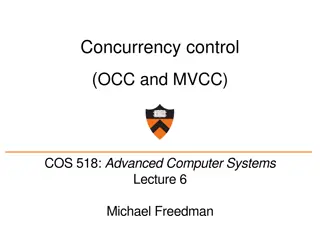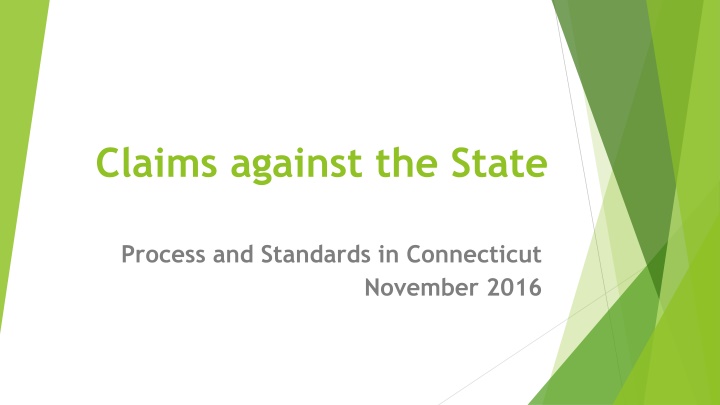
Connecticut Claims Against the State Process and Standards 2016
Learn about the process and legal standards for filing claims against the state in Connecticut. Explore the jurisdiction, exceptions, and how to seek relief for various types of claims. Understand the authority, recent changes, and what to expect during the hearing.
Uploaded on | 3 Views
Download Presentation

Please find below an Image/Link to download the presentation.
The content on the website is provided AS IS for your information and personal use only. It may not be sold, licensed, or shared on other websites without obtaining consent from the author. If you encounter any issues during the download, it is possible that the publisher has removed the file from their server.
You are allowed to download the files provided on this website for personal or commercial use, subject to the condition that they are used lawfully. All files are the property of their respective owners.
The content on the website is provided AS IS for your information and personal use only. It may not be sold, licensed, or shared on other websites without obtaining consent from the author.
E N D
Presentation Transcript
Claims against the State Process and Standards in Connecticut November 2016
The Claims Commissioner Appointed for 4 year term by Governor and confirmed by Legislature Currently Christy Scott Claims against the state must be presented to Claims Commissioner
Contents Legal Authority Recent Changes General What to File (Jurisdiction) Recent Changes Inmates More Exceptions to Jurisdiction Upcoming Changes Possible Forms of Relief Common Types of Claims Legal Standards for Relief Sovereign Immunity Principles When to File (Statute of Limitations) FY 16 Claims Activity How to File List of Attachments Process After Filing Contact Us What to Expect at the Hearing
Legal Authority Section 4 of article eleven of the Connecticut Constitution: Claims against the State shall be resolved in such manner as may be provided by law. Connecticut General Statutes chapter 53 ( 4-141 et seq.) Regulations of Connecticut State Agencies 4-157-1 to 4-157-17 General Statutes 54-102uu (wrongful incarceration) General Statutes 18-81y (inmate lost property)
What to File (Jurisdiction) Any claim against the state seeking monetary damages or permission to sue for monetary damages EXCEPT: Claims listed in General Statutes 4-142-- (1) claims for periodic payment of disability, pension, retirement or other employment benefits; (2) claims upon which suit is otherwise authorized by law including suits to recover similar relief arising from the same set of facts; (3) claims for which an administrative hearing procedure otherwise is established by law; (4) requests by political subdivisions of the state for the payment of grants in lieu of taxes; and (5) claims for the refund of taxes.
More Exceptions to Jurisdiction Claims pursuant to a public works contract ( 4-61); Claims related to defective highways ( 13a-144); Claims pursuant to the Personal Data Act ( 4-197); Claims regarding the rights of patients treated for psychiatric disabilities ( 17a- 550); Claims related to the operation of state-owned vehicles ( 52-556).
Possible Forms of Relief Immediate payment of damages up to $20,000; or A recommended payment in excess of $20,000 to be reviewed by the legislature; or Authorize suit against the state.
Legal Standards for Relief The Commissioner may order or recommend payment of damages if she determines the claim is a just claim. 4-158 (a). A just claim is one which in equity and justice the state should pay, provided the state has caused damage or injury or has received a benefit. 4-141. The Commissioner may authorize an action against the state when she deems it just and equitable and the claim presents an issue of law or fact under which the state, were it a private person, could be liable. 4-160 (a). In the case of a medical malpractice claim, the Commissioner shall authorize suit if the claimant submits a certificate of good faith in accordance with 52-190a.
When to File (Statute of Limitations) Within one year after claim accrues ( 4-148) Accrues on date damage or injury is sustained or discovered or In the exercise of reasonable care should have been discovered. Claim cannot be presented more than 3 years from the date of the act or event.
How to File File notice of claim by mail or hand delivery with Office of the Claims Commissioner ( 4-147) Signed by claimant or attorney; Include name and address of claimant and attorney, if any; Provide concise statement of claim, including date, time, place, circumstances, state agency involved, dollar amount requested; In duplicate (one original and one copy); Filing fee or application for waiver of filing fee; If inmate claimant, description of administrative remedies exhausted; If claim for $5000 or less, highly recommended that notice is sworn and notarized and supported by documentation to allow for resolution without hearing.
Process after Filing Notice of claim sent to Attorney General s Office (AGO) by OCC AGO files appearance Commissioner issues order for AGO to file position statement AGO files position statement Commissioner issues scheduling and predisposition memoranda orders Parties engage in discovery, if appropriate Discovery disputes, if any, are presented to and resolved by Commissioner AGO files dispositive motion, if appropriate Commissioner rules on dispositive motion, if any Formal hearing held, if needed (claims for $5000 or less may be resolved on papers) Commissioner issues final decision 1) 2) 3) 4) 5) 6) 7) 8) 9) 10) 11)
What to Expect at the Hearing The Commissioner is not bound by the rules of evidence or the Uniform Administrative Procedures Act; 4-151 (b) and 4-164a; The Commissioner may call witnesses, examine and cross-examine any witness, require information not offered and stipulate matters to be argued; 4-151 (b); Hearing procedure governed by regulations 4-157-1 to 4-157-17; Rules of evidence are relaxed and focused on probative value; Regs 4-157- 17; Objections and motions allowed; Regs 4-157-11; Parties are expected to pre-mark exhibits prior to hearing; Opening statements and post-hearing briefs are not typically requested by the Commissioner. Closing statements are typically invited.
Recent Changes--General Revised single claim form for all claim types; Email filing of pleadings (not notice of claim); New scheduling order streamlined with shorter deadlines; New predisposition memorandum order simplified and clarified; Hearings for both liability and damages unless bifurcated; Sua sponte notice of possible dismissal; Automatic permission to sue for certain claims with related action pending in Superior Court.
Recent Changes--Inmates Fee waiver new simplified form; applying Superior Court eligibility rules; no account balance information required. Public Act 16-127 23, effective June 9, 2016: Exhaustion-- Must exhaust DoC administrative remedies prior to filing claim; Must include description of exhausted remedies in notice of claim; Statute of limitations tolled until one year after exhaustion. Three strikes No waiver of filing fee for inmate who has had 3 or more claims dismissed as frivolous, duplicative, malicious or for failure to state a claim upon which relief could be granted.
Recent ChangesInmates (continued) Wrongful Incarceration, General Statutes 54-102uu: Amended by 29 of P.A. 16-127, effective June 9, 2016; Changes eligibility criteria for compensation for wrongful incarceration; Changes basis and criteria for damages calculation; Creates opportunity for review by legislature; Requires claimant to relinquish right to any other action arising out of wrongful conviction and incarceration.
Upcoming Changes Docket management software program with electronic filing and public access; Claims Magistrates to review and hear claims and make recommendations to the Commissioner; Rules of practice
Common Types of Claims Premises Defects Contract Breach/Unjust Enrichment Property Damage/Loss Medical Malpractice Standard of Care (non-medical)
Sovereign Immunity Principles The doctrine of sovereign immunity is a rule of common law that operates as a strong presumption in favor of the state s immunity from liability or suit. Envirotest Systems Corp. v. Commissioner of Motor Vehicles, 293 Conn. 382, 387-88, 978 A.2d 49 (2009). It is a well-established principle that statutes in derogation of sovereign immunity should be strictly construed so that the state s sovereign immunity may not be undermined. Where there is any doubt about the meaning or intent of a statute, it is given the effect which makes the least rather than the most change in sovereign immunity. Cales v. Office of Victim Services, 319 Conn. 697, 701-02, 127 A.3d 154 (2015); Columbia Air Services v. Department of Transportation, 293 Conn. 342, 349, 977 A.2d 636 (2009).
Sovereign Immunity Principles (continued) General Statutes 4-142 (2) prohibits claims upon which suit otherwise is authorized by law including suits to recover similar relief arising from the same set of facts. Examples-- 42 U.S.C. 1983 actions against state officers or employees in their individual capacity for violation of constitutional or federal civil rights; Actions against state officers or employees in their individual capacity for acts that are wanton, reckless or malicious, or outside the scope of their employment; General Statutes 4-165; Actions against the state alleging violation of Title VII of the Civil Rights Act of 1964, 42 U.S.C. 2000e et seq.
FY 16 Claims Activity 331 new claims filed, 134 of which filed by inmates 482 total claims adjudicated/resolved, including 81 new claims and 177 inmate claims 5 new wrongful incarceration claims filed 16 wrongful incarceration claims adjudicated with awards totaling $27,285,500 for 8 wrongful incarceration claims Total award of $52,571 for 47 claims where award did not exceed $20,000 39 claimants granted permission to sue the state
List of Attachments Revised Claim Form How to File a Claim Statutes Related to the Office of the Claims Commissioner Fee Waiver Application Form Regulations Public Act 16-127 Scheduling Order Predisposition Memoranda Order Waiver of 2-Year Deadline Letter Right to Appeal Letter Appeal Acknowledgment Letter
Contact Us Effective November 11, 2016, this is our new address: Office of the Claims Commissioner 450 Columbus Boulevard North Tower, Suite 203 Hartford, CT 06103 Our new fax number: (860) 706-1482 Email: claims.commissioner@ct.gov Telephone: (860) 713-5501

